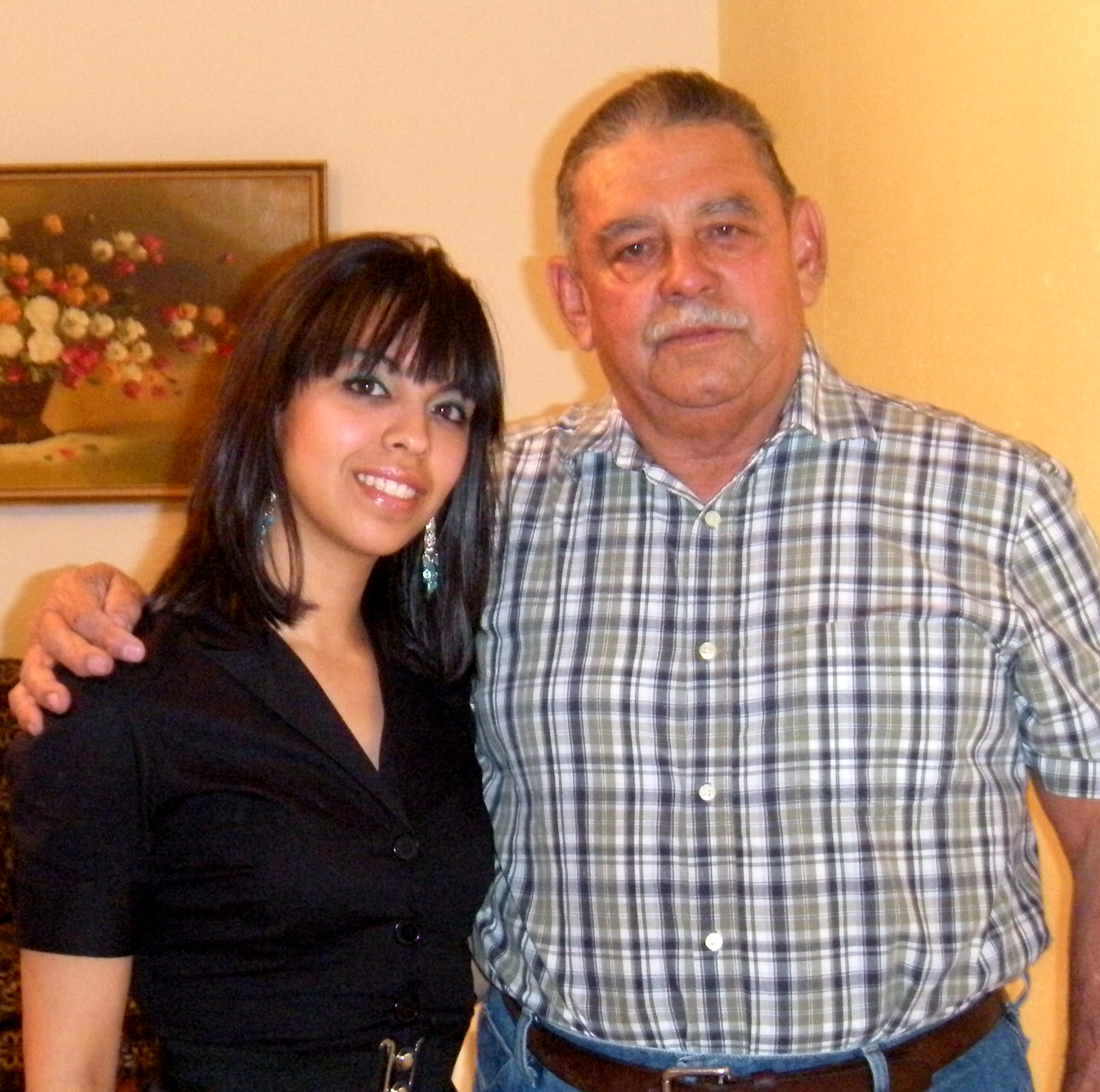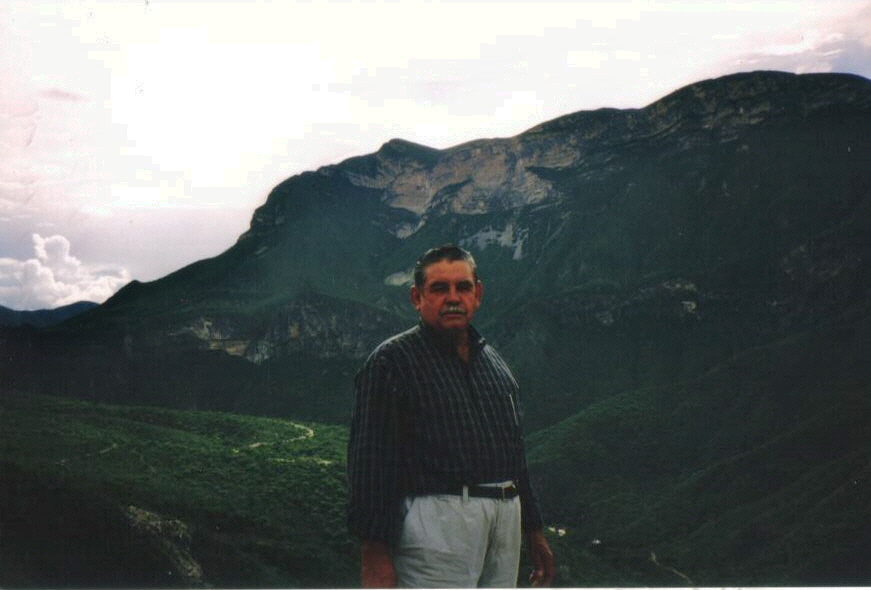TRANSCRIPTION
What was your childhood like?
My childhood was very beautiful. I was raised in a very clean atmosphere. When I was a teenager, I never had bad friends. My parents wouldn't let me.
What was your family like? High-class? Middle-class?
My family was middle class. But…we had our own cars, houses, 3 cows...My grandpa Emiliano had a farm. Grandpa bought a cow. We were never without milk. They (the cows) had so much milk we would give some to the dogs.
What were some of your childhood memories?
One memory, I was about 5 or 6 years old. Maybe 1941-1942, I remember a very loud noise of airplanes that were flying above their city. They were war airplanes. They had left the base from Normandy TX, 12 miles from Eagle Pass. The planes passed over Piedras Negras. They were airplanes of 2 motors. My older brother Daniel counted about 50 of them. Another memory…It was a very hot afternoon about 1945, the sun was hiding. In the direction to the north, you would see something that looked to the other side of the sun that was hiding…I could see a splendor, like orange color, coming out from the night. And I couldn't see anymore because my parents were sending me to bed. The next day, I found out it was an Atomic Bomb being tested in Alamo (Alamos, Mexico). That same year, after the war, WWII, there was a big foundry that would take recycled material of war parts. The foundry was from the US to Mexico. They could convert it to steel. From those there were big bullets…huge. When they would examine them, they would explode. The people would steal them. At that time, a boy was playing, and actually hit one of those, and it exploded, and it killed him.
What would you do for fun?
We would go fishing, joke around. We liked to look for treasure. We never found anything.

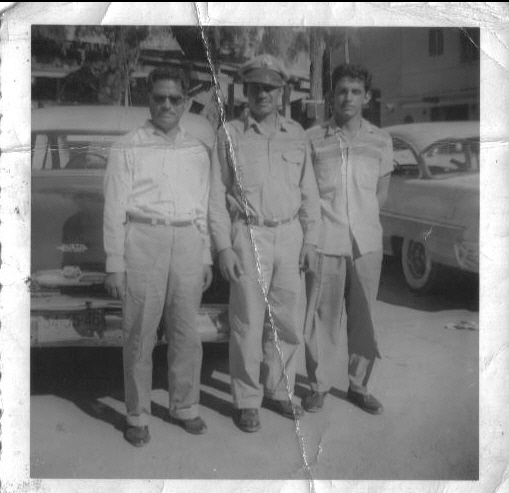
Tell me about the service you had to do for Mexico?
The military service in Mexico, when you turn 18, it's one year obligation to train every weekend. We would shoot riffles to targets. We would have 4 bullets and if you wanted to shoot more…(starts laughing) you had to pay more for more bullets.
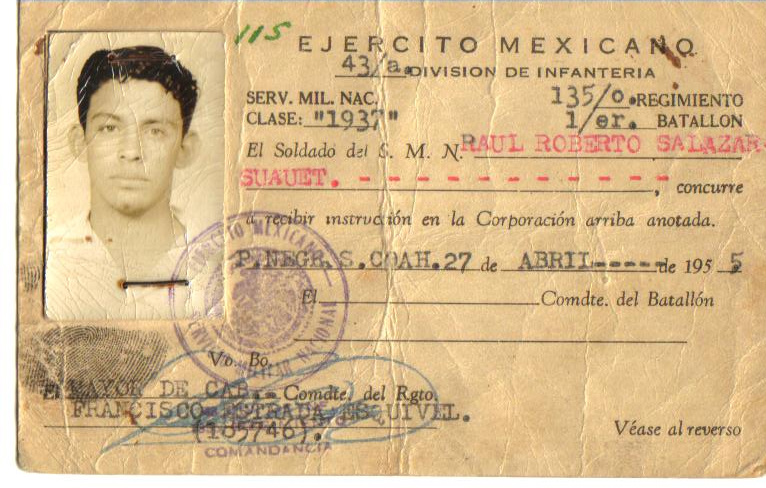
What was your fist car?
1950 Chevy Sedan. I was 18 or 19. I worked at a foundry and bought my first car it was $240. The stick shift was here…on the side of the wheel.
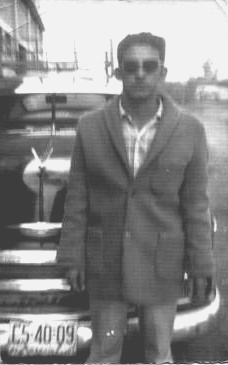
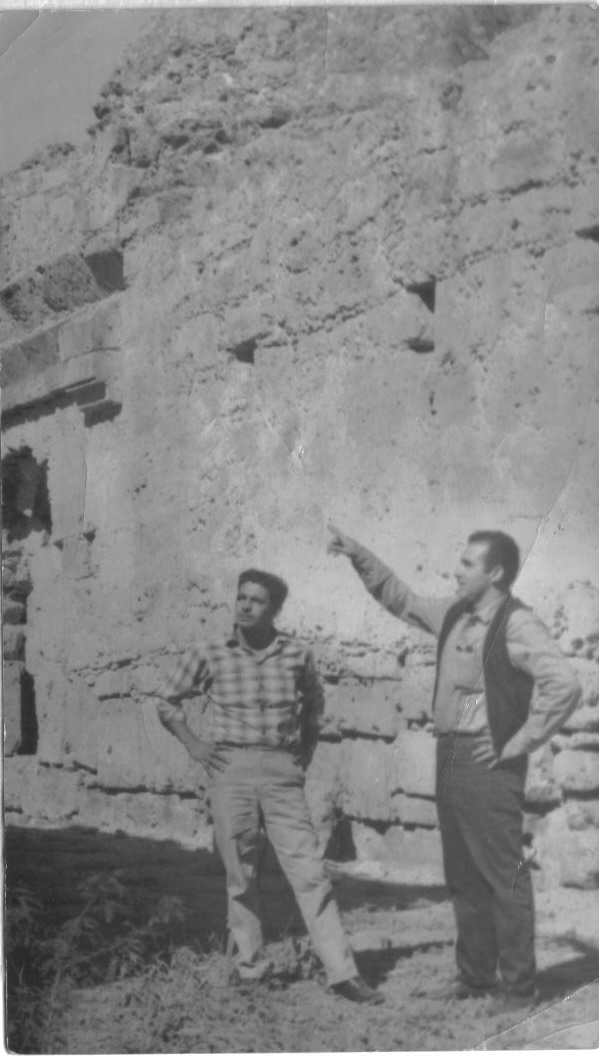 Presidio San Bernardo
Presidio San Bernardo
When you lived in Mexico, who did you live with?
I lived with my parents until I was around…27. And then I came over here.
Did they accept the idea of you coming over here?
I remember they accepted the idea of me coming over here. When I did good with jobs I sent them money.
How did you get to San Antonio?
Local passport. At that time, you could go up to 150 miles with it. In the 1960's they needed a lot of welders because they didn't have enough people to weld. In Mexico, I learned how to weld, but since they paid more here I came over here. Since then, that's where I made all my money.
Where did you live?
Maruca (sister) was here in 1962 so I lived with her. Only for 4 or 5 months. Then I rented a house and lived by myself. It was on W. Gerald.
Was it hard to get a job?
No. Because I had training and experience in flat, vertical and over-head which were the three types of welding. They just made you pass the welding test and that was it. Newell Manufacturing was located at Montana and Hoffman. Now where the Alamo Dome is. That company was already making their third shredder. They shredded cars to make iron; my first boss was Philip Melvin, an Anglo. When they would go out to eat, we saw the first construction of the hemisphere.
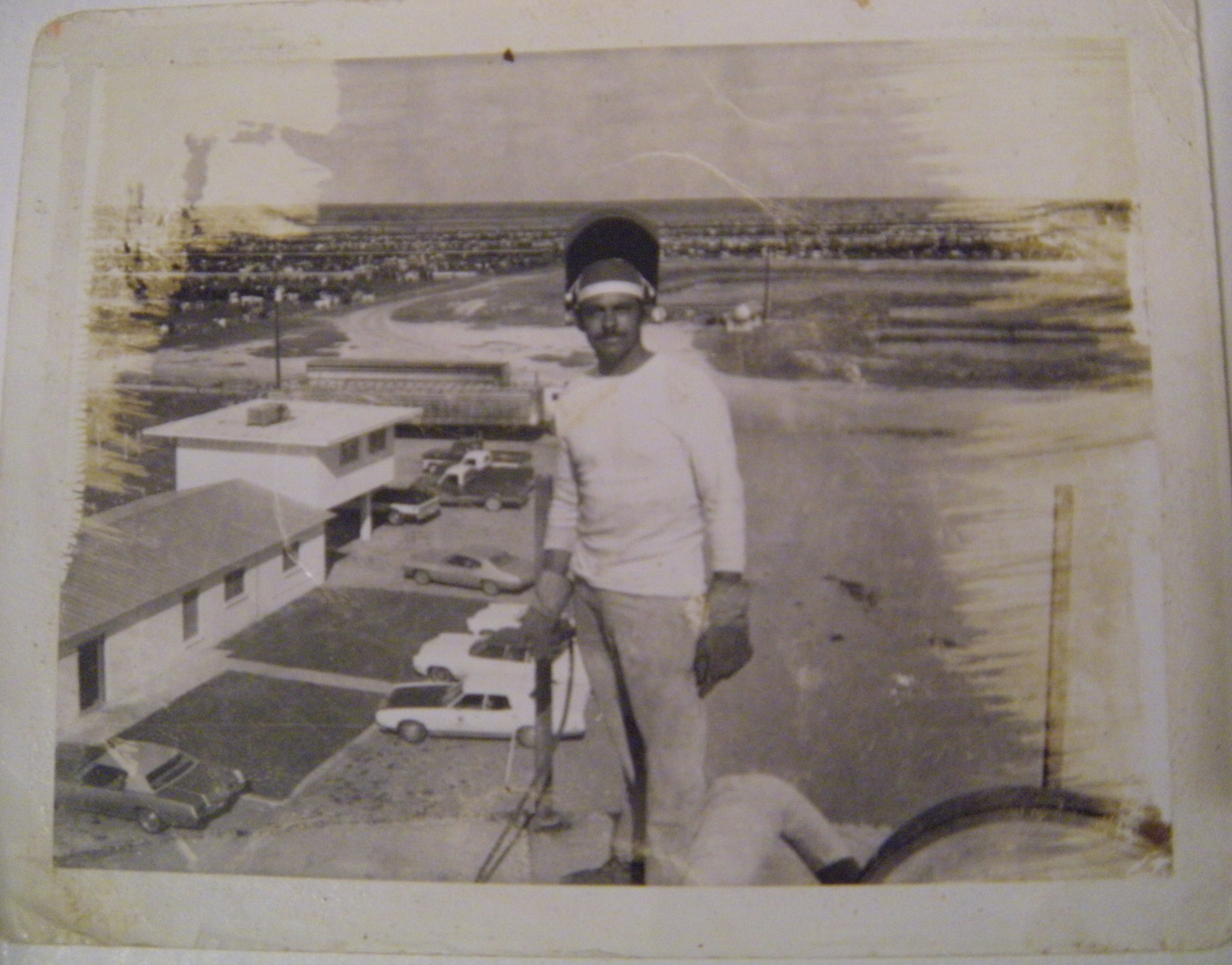
Did they let you talk Spanish there? Did they accept it?
No. They wanted you to talk English. But they never told me or expected me to speak English because they were only looking at the way I worked. I was the one that always had the best salary. I was never discriminated because I was from Mexico I was very fortunate.
How much money did you make?
In 1964...it was a lot. I would make $2.50 an hour. I made a little over a hundred dollars a week.
What would you do with your money?
Send it to my family. And to my sisters. And I liked to buy things like radios, and I bought a car. 1958 Chevy Bellaire. I loved to have old cars and work on old cars.
When did you and Helena get married?
…(he looked at grandma for the answer but she said "No! I want you to answer!) He laughed…then replied July 27, 1967.
When did you meet Helena?
1965. I fixed a flat for her mom and she caught my eye.

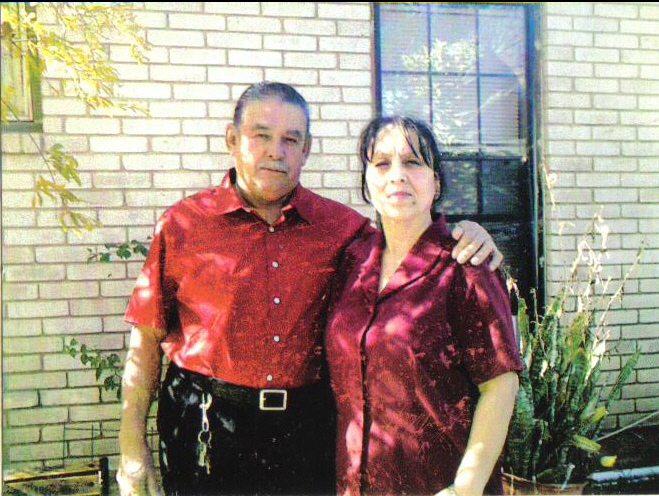
What job did you have when you had your family?
Newell. Maybe 20 years, and Longhorn Keiser Cement, I was a maintenance mechanic, maybe 13 years. The company shut down.
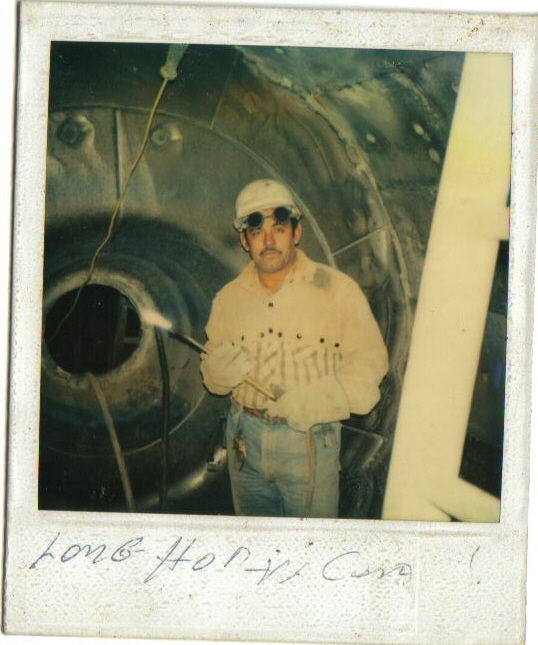
Are you happy your children and grandchildren grew up in the US?
Yes because…I wanted to be a pilot. Because I didn't have money, I couldn't go to school. Now, I'm happy my children had that opportunity I never had. My country is the one that gave me my job. Because of the money I made I was able to raise my family. I'm happy that all my children finished school and have good jobs…I'm also happy because none of my children have been in prison, accused of drugs, or anything like that. And also, I'm very fortunate that they have always been able to work.
What do you see about immigration today that's different from then?
What I see now, about immigration if you don't come down here prepared or experienced it's very hard. One experience I had, when I would pass my welding tests, they never asked if I knew English. They would ask me questions in English, and I would answer in the best English I could. They mainly asked about education. They never asked for immigration papers. The local pass port was only to come here and buy things, and take them back. When I got here, I went to the Social Security office with the local passport and applied for the social security card. The local passport had all my information…that was enough (May 1963)
When did that change? When did you have to get more than that?
In 1970, I got my immigration papers, my green card. Because if I wanted to stay here, I had to have them… at that time. In 1996 I took the citizenship test and passed.
Why? What made you decide to take that?
So I could vote. Because, I saw certain politics offering certain things they couldn't complete. A very big privilege for immigrants is that they let them vote. To become a voter, I became a citizen. You have more rights than just having a green card. I vote for democracy.
What do you miss most about Mexico and the way you lived there?
You can't compare them…well… (at this time, Helena repeated the question). I miss my childhood friends from school. Almost all of them have died…You can't compare the way of life in the US to the life of Mexico. In Mexico, they really don't share their riches the way they should with the people. There were very good ideas once, when the Revolution was initiated, but, the political parties destroyed them. In America, I could see the riches were divided. They know how to divide their share of money.
Is there anything you would like to add about immigration? Or anything?
I would like for those programs to help out young people that want to study regardless if they are children of immigration or children of here. I have seen certain programs killed that young people had. Project quest, the political used money for candidate benefit. It wasn't supposed to be used for that. In reference to illegal immigrants right now…they don't need them because there's no jobs, but if economy goes up again…they're going to accept illegals secretly under the water because they're going to work more. Also, I don't think it's right that there's religion in schools. There's always a war because you're never going to agree.
Grandpa it's because of you that we're here, your children, your grandchildren and your grandchildren. What would you like us to keep in mind?
Again, I wish and want all children to continue to study, and go to school and do whatever you need to do…So you can achieve what you want so they don't politicize the education of kids and adults…Very important, kids in school shouldn't have too many days off in school. More school. The more holidays, the less time you have for studies. Also, a word I use…"Like they see you is how they will treat you." Those are things I've seen and analyzed.
